University of Malta Literature Review: Cancer Caregiver Experiences
VerifiedAdded on 2022/08/17
|16
|4512
|19
Literature Review
AI Summary
This literature review examines the lived experiences of caregivers of adult cancer patients undergoing oncology treatment. It explores the emotional, psychological, and social challenges faced by caregivers, including the impact on their mental and physical health. The review utilizes the Transactional Model of Stress and Coping to understand how caregivers appraise and cope with the demands of caregiving. The search strategy employed databases like EBSCO, PubMed, and CINAHL, using keywords like 'cancer', 'caregivers', and 'experiences'. The review includes five selected articles, discussing results, implications for future practice, and limitations. The articles cover topics like emotional burden, communication challenges, depression, anxiety, and quality of life, offering insights for healthcare professionals and nurses to improve caregiver support. The review highlights the need for comprehensive information, social support, and healthcare literacy to mitigate the negative impacts on caregivers.
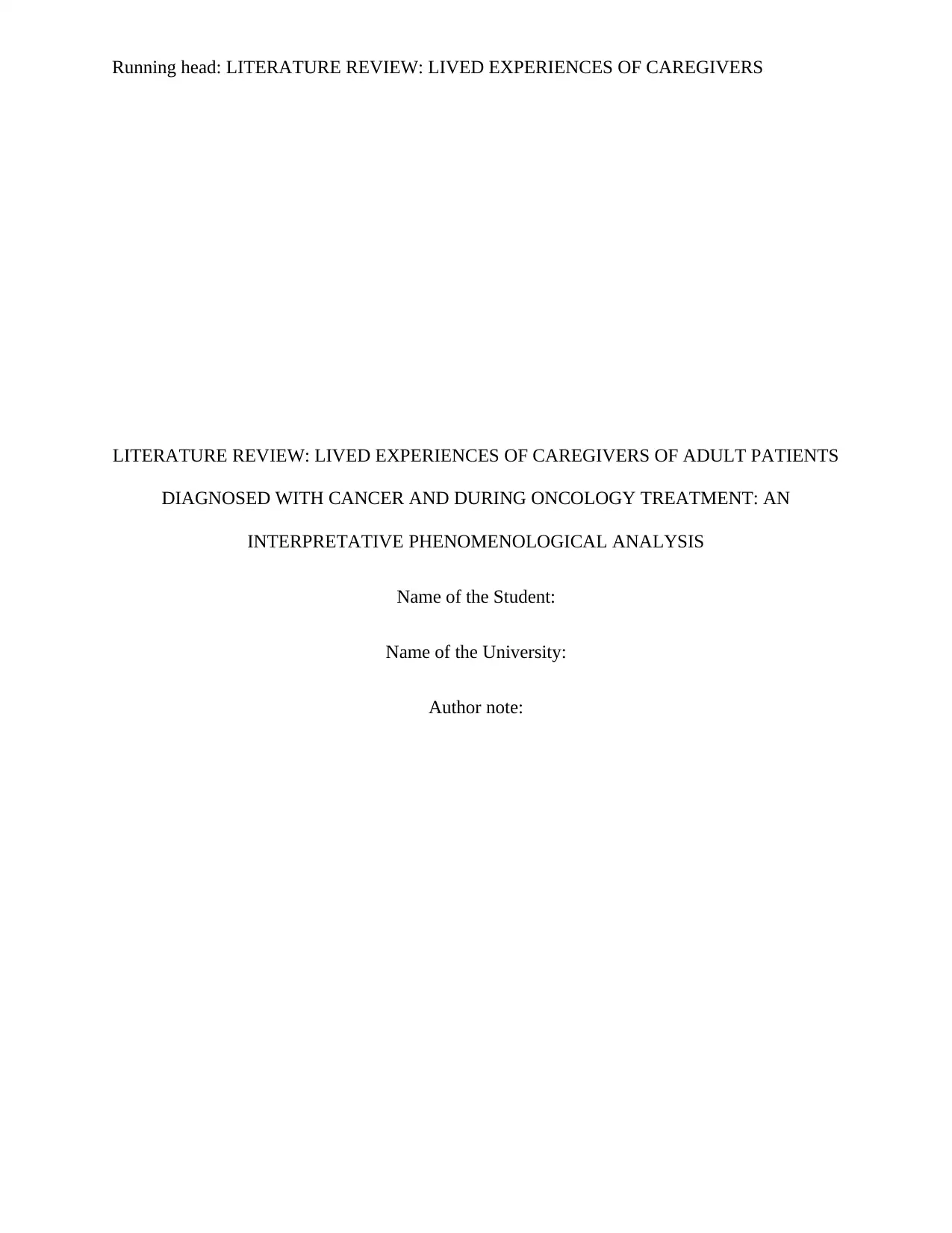
Running head: LITERATURE REVIEW: LIVED EXPERIENCES OF CAREGIVERS
LITERATURE REVIEW: LIVED EXPERIENCES OF CAREGIVERS OF ADULT PATIENTS
DIAGNOSED WITH CANCER AND DURING ONCOLOGY TREATMENT: AN
INTERPRETATIVE PHENOMENOLOGICAL ANALYSIS
Name of the Student:
Name of the University:
Author note:
LITERATURE REVIEW: LIVED EXPERIENCES OF CAREGIVERS OF ADULT PATIENTS
DIAGNOSED WITH CANCER AND DURING ONCOLOGY TREATMENT: AN
INTERPRETATIVE PHENOMENOLOGICAL ANALYSIS
Name of the Student:
Name of the University:
Author note:
Paraphrase This Document
Need a fresh take? Get an instant paraphrase of this document with our AI Paraphraser
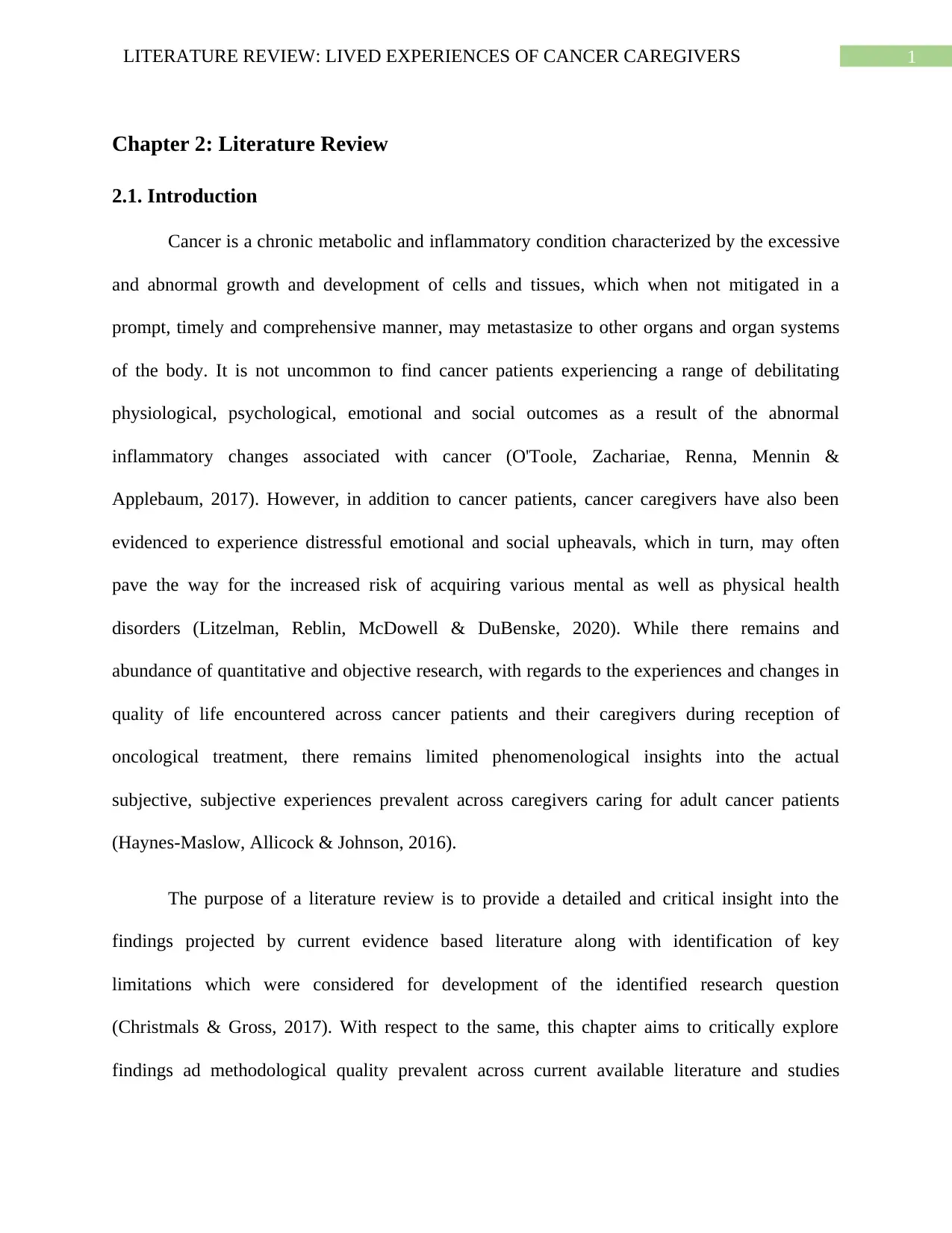
1LITERATURE REVIEW: LIVED EXPERIENCES OF CANCER CAREGIVERS
Chapter 2: Literature Review
2.1. Introduction
Cancer is a chronic metabolic and inflammatory condition characterized by the excessive
and abnormal growth and development of cells and tissues, which when not mitigated in a
prompt, timely and comprehensive manner, may metastasize to other organs and organ systems
of the body. It is not uncommon to find cancer patients experiencing a range of debilitating
physiological, psychological, emotional and social outcomes as a result of the abnormal
inflammatory changes associated with cancer (O'Toole, Zachariae, Renna, Mennin &
Applebaum, 2017). However, in addition to cancer patients, cancer caregivers have also been
evidenced to experience distressful emotional and social upheavals, which in turn, may often
pave the way for the increased risk of acquiring various mental as well as physical health
disorders (Litzelman, Reblin, McDowell & DuBenske, 2020). While there remains and
abundance of quantitative and objective research, with regards to the experiences and changes in
quality of life encountered across cancer patients and their caregivers during reception of
oncological treatment, there remains limited phenomenological insights into the actual
subjective, subjective experiences prevalent across caregivers caring for adult cancer patients
(Haynes-Maslow, Allicock & Johnson, 2016).
The purpose of a literature review is to provide a detailed and critical insight into the
findings projected by current evidence based literature along with identification of key
limitations which were considered for development of the identified research question
(Christmals & Gross, 2017). With respect to the same, this chapter aims to critically explore
findings ad methodological quality prevalent across current available literature and studies
Chapter 2: Literature Review
2.1. Introduction
Cancer is a chronic metabolic and inflammatory condition characterized by the excessive
and abnormal growth and development of cells and tissues, which when not mitigated in a
prompt, timely and comprehensive manner, may metastasize to other organs and organ systems
of the body. It is not uncommon to find cancer patients experiencing a range of debilitating
physiological, psychological, emotional and social outcomes as a result of the abnormal
inflammatory changes associated with cancer (O'Toole, Zachariae, Renna, Mennin &
Applebaum, 2017). However, in addition to cancer patients, cancer caregivers have also been
evidenced to experience distressful emotional and social upheavals, which in turn, may often
pave the way for the increased risk of acquiring various mental as well as physical health
disorders (Litzelman, Reblin, McDowell & DuBenske, 2020). While there remains and
abundance of quantitative and objective research, with regards to the experiences and changes in
quality of life encountered across cancer patients and their caregivers during reception of
oncological treatment, there remains limited phenomenological insights into the actual
subjective, subjective experiences prevalent across caregivers caring for adult cancer patients
(Haynes-Maslow, Allicock & Johnson, 2016).
The purpose of a literature review is to provide a detailed and critical insight into the
findings projected by current evidence based literature along with identification of key
limitations which were considered for development of the identified research question
(Christmals & Gross, 2017). With respect to the same, this chapter aims to critically explore
findings ad methodological quality prevalent across current available literature and studies
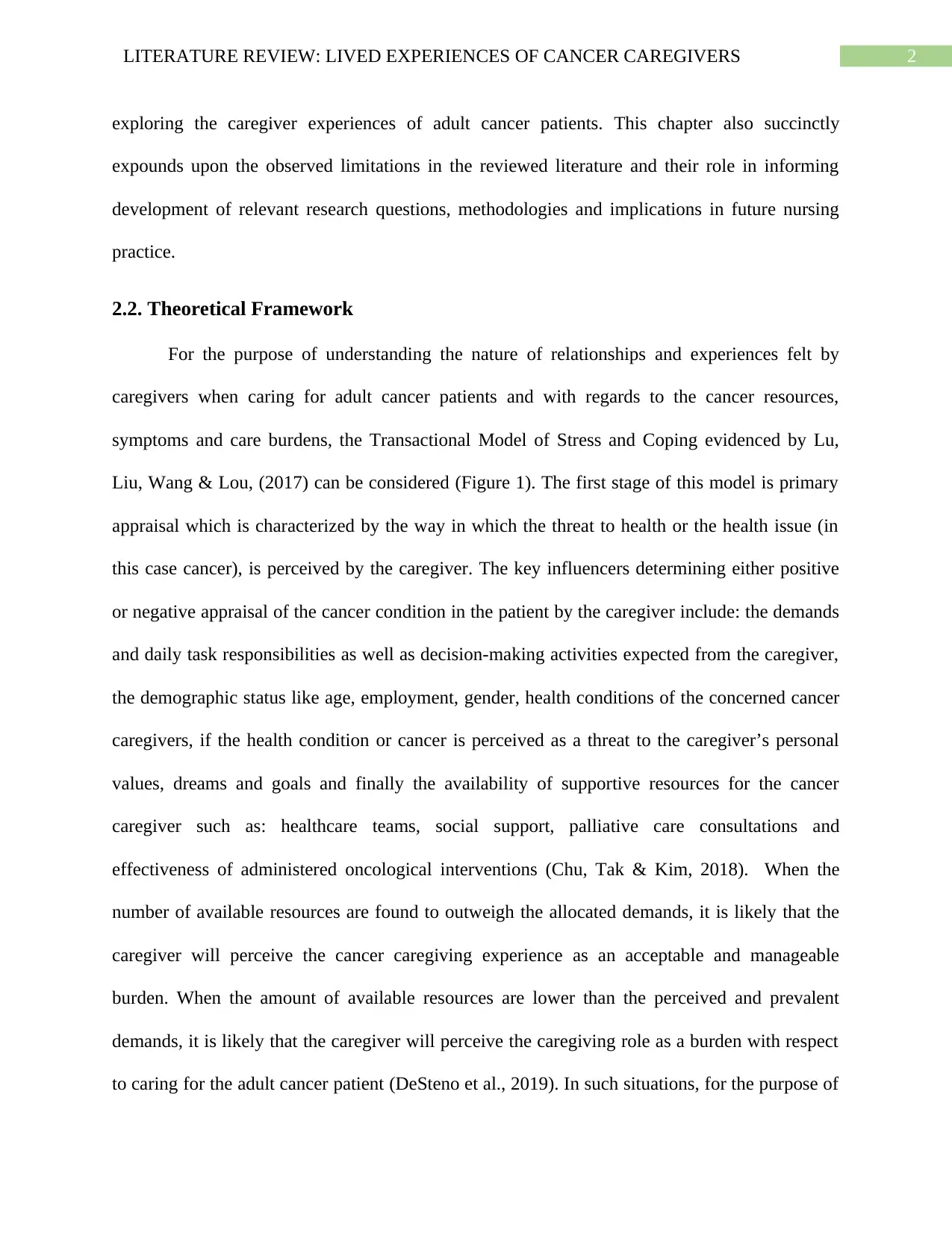
2LITERATURE REVIEW: LIVED EXPERIENCES OF CANCER CAREGIVERS
exploring the caregiver experiences of adult cancer patients. This chapter also succinctly
expounds upon the observed limitations in the reviewed literature and their role in informing
development of relevant research questions, methodologies and implications in future nursing
practice.
2.2. Theoretical Framework
For the purpose of understanding the nature of relationships and experiences felt by
caregivers when caring for adult cancer patients and with regards to the cancer resources,
symptoms and care burdens, the Transactional Model of Stress and Coping evidenced by Lu,
Liu, Wang & Lou, (2017) can be considered (Figure 1). The first stage of this model is primary
appraisal which is characterized by the way in which the threat to health or the health issue (in
this case cancer), is perceived by the caregiver. The key influencers determining either positive
or negative appraisal of the cancer condition in the patient by the caregiver include: the demands
and daily task responsibilities as well as decision-making activities expected from the caregiver,
the demographic status like age, employment, gender, health conditions of the concerned cancer
caregivers, if the health condition or cancer is perceived as a threat to the caregiver’s personal
values, dreams and goals and finally the availability of supportive resources for the cancer
caregiver such as: healthcare teams, social support, palliative care consultations and
effectiveness of administered oncological interventions (Chu, Tak & Kim, 2018). When the
number of available resources are found to outweigh the allocated demands, it is likely that the
caregiver will perceive the cancer caregiving experience as an acceptable and manageable
burden. When the amount of available resources are lower than the perceived and prevalent
demands, it is likely that the caregiver will perceive the caregiving role as a burden with respect
to caring for the adult cancer patient (DeSteno et al., 2019). In such situations, for the purpose of
exploring the caregiver experiences of adult cancer patients. This chapter also succinctly
expounds upon the observed limitations in the reviewed literature and their role in informing
development of relevant research questions, methodologies and implications in future nursing
practice.
2.2. Theoretical Framework
For the purpose of understanding the nature of relationships and experiences felt by
caregivers when caring for adult cancer patients and with regards to the cancer resources,
symptoms and care burdens, the Transactional Model of Stress and Coping evidenced by Lu,
Liu, Wang & Lou, (2017) can be considered (Figure 1). The first stage of this model is primary
appraisal which is characterized by the way in which the threat to health or the health issue (in
this case cancer), is perceived by the caregiver. The key influencers determining either positive
or negative appraisal of the cancer condition in the patient by the caregiver include: the demands
and daily task responsibilities as well as decision-making activities expected from the caregiver,
the demographic status like age, employment, gender, health conditions of the concerned cancer
caregivers, if the health condition or cancer is perceived as a threat to the caregiver’s personal
values, dreams and goals and finally the availability of supportive resources for the cancer
caregiver such as: healthcare teams, social support, palliative care consultations and
effectiveness of administered oncological interventions (Chu, Tak & Kim, 2018). When the
number of available resources are found to outweigh the allocated demands, it is likely that the
caregiver will perceive the cancer caregiving experience as an acceptable and manageable
burden. When the amount of available resources are lower than the perceived and prevalent
demands, it is likely that the caregiver will perceive the caregiving role as a burden with respect
to caring for the adult cancer patient (DeSteno et al., 2019). In such situations, for the purpose of
⊘ This is a preview!⊘
Do you want full access?
Subscribe today to unlock all pages.

Trusted by 1+ million students worldwide
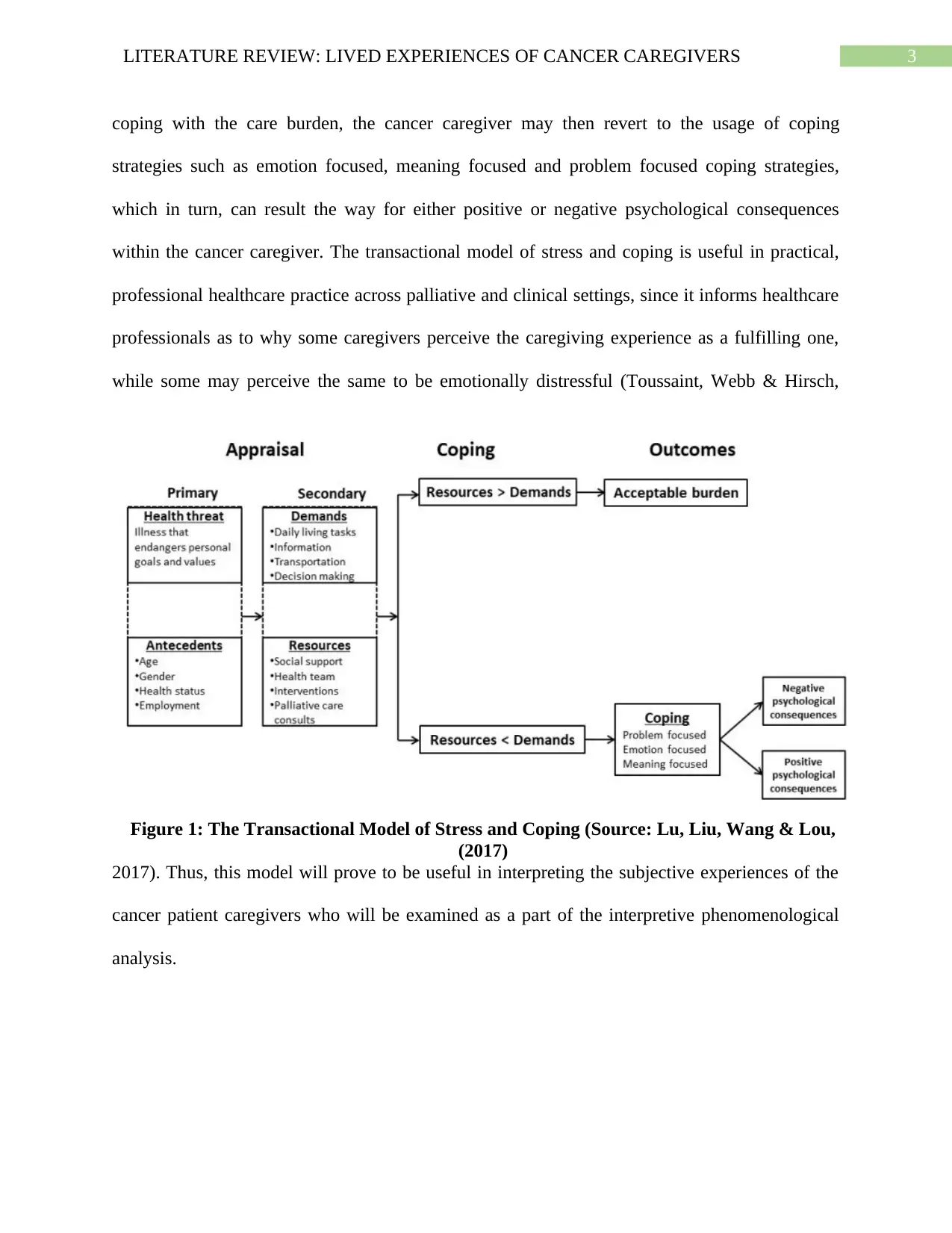
3LITERATURE REVIEW: LIVED EXPERIENCES OF CANCER CAREGIVERS
coping with the care burden, the cancer caregiver may then revert to the usage of coping
strategies such as emotion focused, meaning focused and problem focused coping strategies,
which in turn, can result the way for either positive or negative psychological consequences
within the cancer caregiver. The transactional model of stress and coping is useful in practical,
professional healthcare practice across palliative and clinical settings, since it informs healthcare
professionals as to why some caregivers perceive the caregiving experience as a fulfilling one,
while some may perceive the same to be emotionally distressful (Toussaint, Webb & Hirsch,
2017). Thus, this model will prove to be useful in interpreting the subjective experiences of the
cancer patient caregivers who will be examined as a part of the interpretive phenomenological
analysis.
Figure 1: The Transactional Model of Stress and Coping (Source: Lu, Liu, Wang & Lou,
(2017)
coping with the care burden, the cancer caregiver may then revert to the usage of coping
strategies such as emotion focused, meaning focused and problem focused coping strategies,
which in turn, can result the way for either positive or negative psychological consequences
within the cancer caregiver. The transactional model of stress and coping is useful in practical,
professional healthcare practice across palliative and clinical settings, since it informs healthcare
professionals as to why some caregivers perceive the caregiving experience as a fulfilling one,
while some may perceive the same to be emotionally distressful (Toussaint, Webb & Hirsch,
2017). Thus, this model will prove to be useful in interpreting the subjective experiences of the
cancer patient caregivers who will be examined as a part of the interpretive phenomenological
analysis.
Figure 1: The Transactional Model of Stress and Coping (Source: Lu, Liu, Wang & Lou,
(2017)
Paraphrase This Document
Need a fresh take? Get an instant paraphrase of this document with our AI Paraphraser
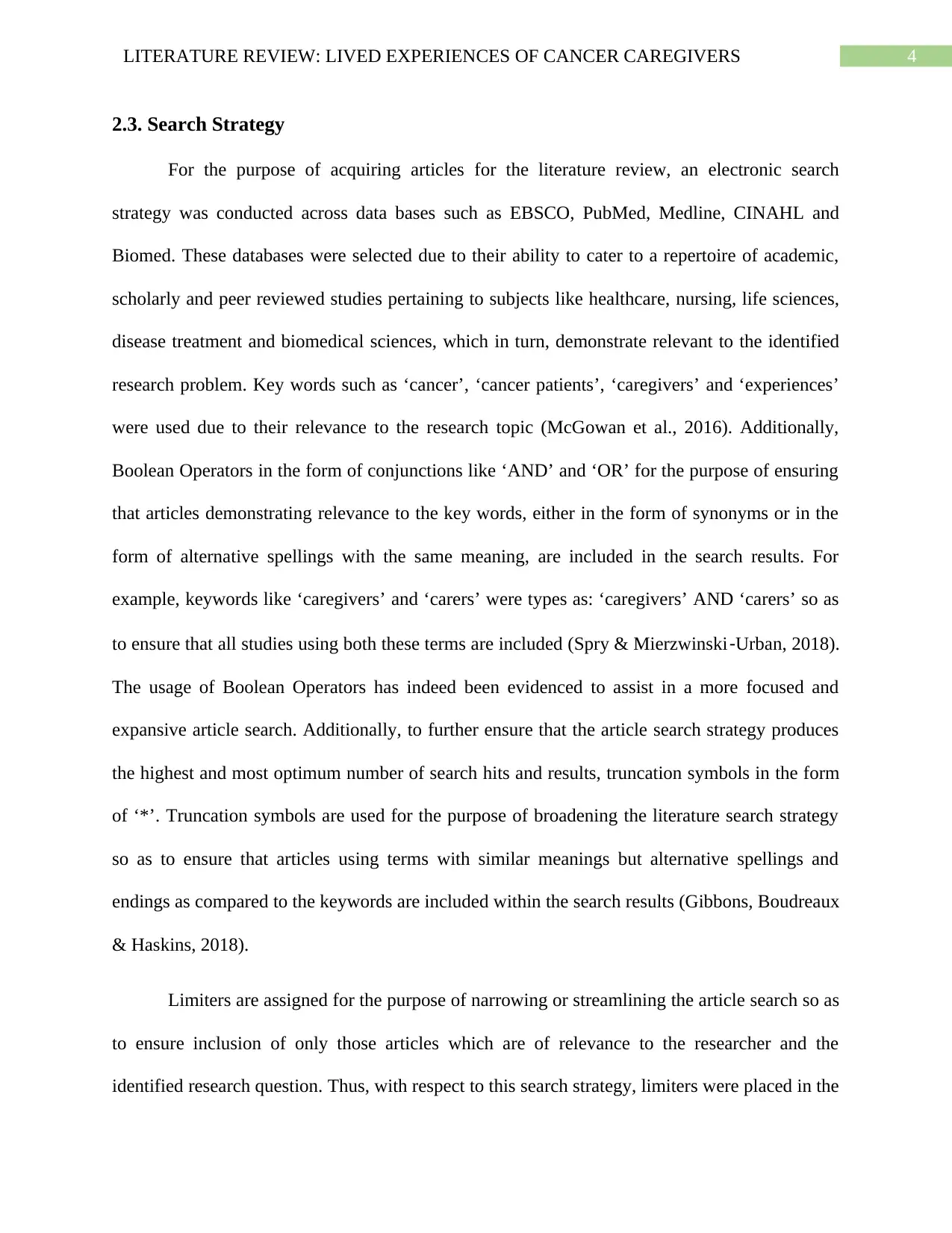
4LITERATURE REVIEW: LIVED EXPERIENCES OF CANCER CAREGIVERS
2.3. Search Strategy
For the purpose of acquiring articles for the literature review, an electronic search
strategy was conducted across data bases such as EBSCO, PubMed, Medline, CINAHL and
Biomed. These databases were selected due to their ability to cater to a repertoire of academic,
scholarly and peer reviewed studies pertaining to subjects like healthcare, nursing, life sciences,
disease treatment and biomedical sciences, which in turn, demonstrate relevant to the identified
research problem. Key words such as ‘cancer’, ‘cancer patients’, ‘caregivers’ and ‘experiences’
were used due to their relevance to the research topic (McGowan et al., 2016). Additionally,
Boolean Operators in the form of conjunctions like ‘AND’ and ‘OR’ for the purpose of ensuring
that articles demonstrating relevance to the key words, either in the form of synonyms or in the
form of alternative spellings with the same meaning, are included in the search results. For
example, keywords like ‘caregivers’ and ‘carers’ were types as: ‘caregivers’ AND ‘carers’ so as
to ensure that all studies using both these terms are included (Spry & Mierzwinski‐Urban, 2018).
The usage of Boolean Operators has indeed been evidenced to assist in a more focused and
expansive article search. Additionally, to further ensure that the article search strategy produces
the highest and most optimum number of search hits and results, truncation symbols in the form
of ‘*’. Truncation symbols are used for the purpose of broadening the literature search strategy
so as to ensure that articles using terms with similar meanings but alternative spellings and
endings as compared to the keywords are included within the search results (Gibbons, Boudreaux
& Haskins, 2018).
Limiters are assigned for the purpose of narrowing or streamlining the article search so as
to ensure inclusion of only those articles which are of relevance to the researcher and the
identified research question. Thus, with respect to this search strategy, limiters were placed in the
2.3. Search Strategy
For the purpose of acquiring articles for the literature review, an electronic search
strategy was conducted across data bases such as EBSCO, PubMed, Medline, CINAHL and
Biomed. These databases were selected due to their ability to cater to a repertoire of academic,
scholarly and peer reviewed studies pertaining to subjects like healthcare, nursing, life sciences,
disease treatment and biomedical sciences, which in turn, demonstrate relevant to the identified
research problem. Key words such as ‘cancer’, ‘cancer patients’, ‘caregivers’ and ‘experiences’
were used due to their relevance to the research topic (McGowan et al., 2016). Additionally,
Boolean Operators in the form of conjunctions like ‘AND’ and ‘OR’ for the purpose of ensuring
that articles demonstrating relevance to the key words, either in the form of synonyms or in the
form of alternative spellings with the same meaning, are included in the search results. For
example, keywords like ‘caregivers’ and ‘carers’ were types as: ‘caregivers’ AND ‘carers’ so as
to ensure that all studies using both these terms are included (Spry & Mierzwinski‐Urban, 2018).
The usage of Boolean Operators has indeed been evidenced to assist in a more focused and
expansive article search. Additionally, to further ensure that the article search strategy produces
the highest and most optimum number of search hits and results, truncation symbols in the form
of ‘*’. Truncation symbols are used for the purpose of broadening the literature search strategy
so as to ensure that articles using terms with similar meanings but alternative spellings and
endings as compared to the keywords are included within the search results (Gibbons, Boudreaux
& Haskins, 2018).
Limiters are assigned for the purpose of narrowing or streamlining the article search so as
to ensure inclusion of only those articles which are of relevance to the researcher and the
identified research question. Thus, with respect to this search strategy, limiters were placed in the
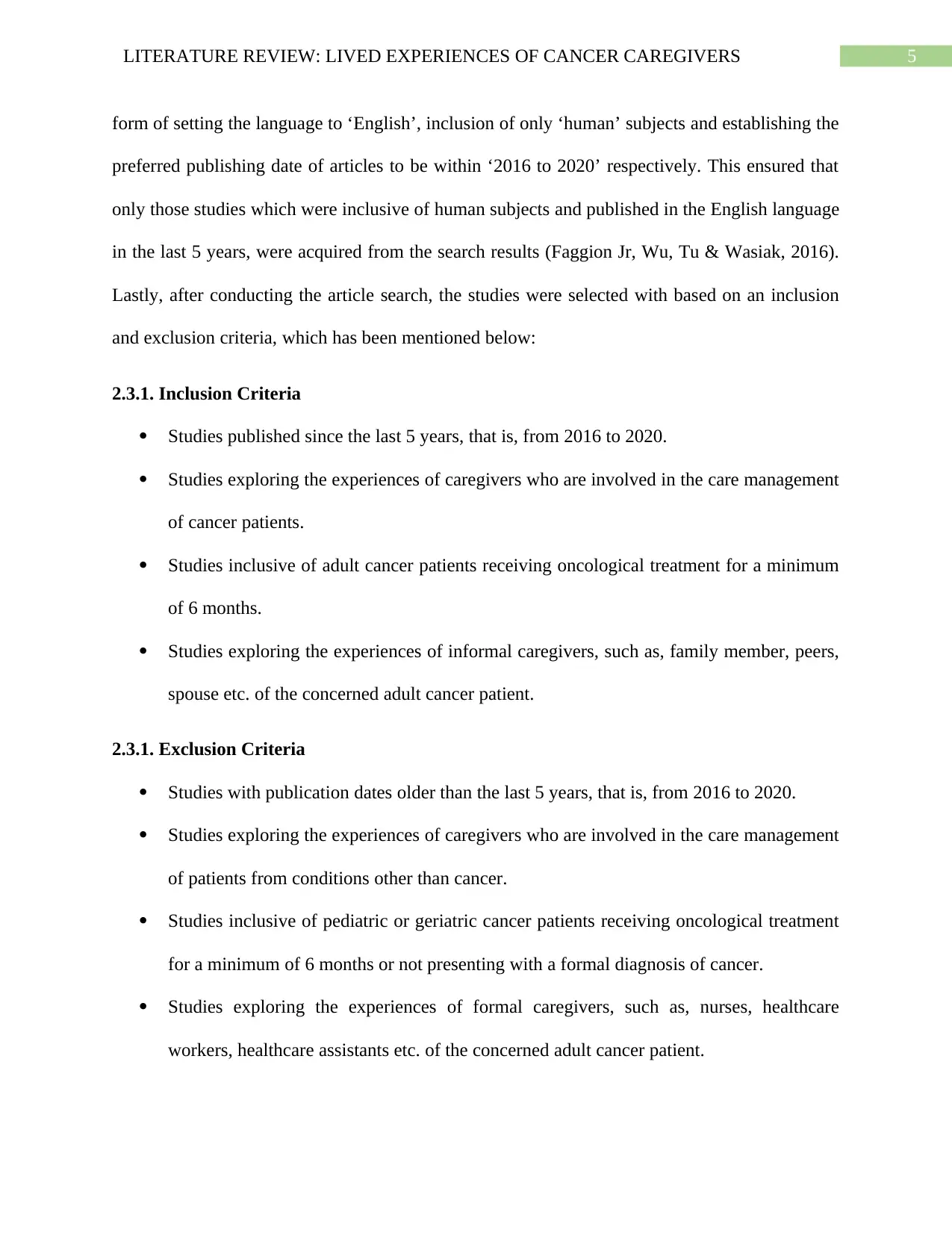
5LITERATURE REVIEW: LIVED EXPERIENCES OF CANCER CAREGIVERS
form of setting the language to ‘English’, inclusion of only ‘human’ subjects and establishing the
preferred publishing date of articles to be within ‘2016 to 2020’ respectively. This ensured that
only those studies which were inclusive of human subjects and published in the English language
in the last 5 years, were acquired from the search results (Faggion Jr, Wu, Tu & Wasiak, 2016).
Lastly, after conducting the article search, the studies were selected with based on an inclusion
and exclusion criteria, which has been mentioned below:
2.3.1. Inclusion Criteria
Studies published since the last 5 years, that is, from 2016 to 2020.
Studies exploring the experiences of caregivers who are involved in the care management
of cancer patients.
Studies inclusive of adult cancer patients receiving oncological treatment for a minimum
of 6 months.
Studies exploring the experiences of informal caregivers, such as, family member, peers,
spouse etc. of the concerned adult cancer patient.
2.3.1. Exclusion Criteria
Studies with publication dates older than the last 5 years, that is, from 2016 to 2020.
Studies exploring the experiences of caregivers who are involved in the care management
of patients from conditions other than cancer.
Studies inclusive of pediatric or geriatric cancer patients receiving oncological treatment
for a minimum of 6 months or not presenting with a formal diagnosis of cancer.
Studies exploring the experiences of formal caregivers, such as, nurses, healthcare
workers, healthcare assistants etc. of the concerned adult cancer patient.
form of setting the language to ‘English’, inclusion of only ‘human’ subjects and establishing the
preferred publishing date of articles to be within ‘2016 to 2020’ respectively. This ensured that
only those studies which were inclusive of human subjects and published in the English language
in the last 5 years, were acquired from the search results (Faggion Jr, Wu, Tu & Wasiak, 2016).
Lastly, after conducting the article search, the studies were selected with based on an inclusion
and exclusion criteria, which has been mentioned below:
2.3.1. Inclusion Criteria
Studies published since the last 5 years, that is, from 2016 to 2020.
Studies exploring the experiences of caregivers who are involved in the care management
of cancer patients.
Studies inclusive of adult cancer patients receiving oncological treatment for a minimum
of 6 months.
Studies exploring the experiences of informal caregivers, such as, family member, peers,
spouse etc. of the concerned adult cancer patient.
2.3.1. Exclusion Criteria
Studies with publication dates older than the last 5 years, that is, from 2016 to 2020.
Studies exploring the experiences of caregivers who are involved in the care management
of patients from conditions other than cancer.
Studies inclusive of pediatric or geriatric cancer patients receiving oncological treatment
for a minimum of 6 months or not presenting with a formal diagnosis of cancer.
Studies exploring the experiences of formal caregivers, such as, nurses, healthcare
workers, healthcare assistants etc. of the concerned adult cancer patient.
⊘ This is a preview!⊘
Do you want full access?
Subscribe today to unlock all pages.

Trusted by 1+ million students worldwide
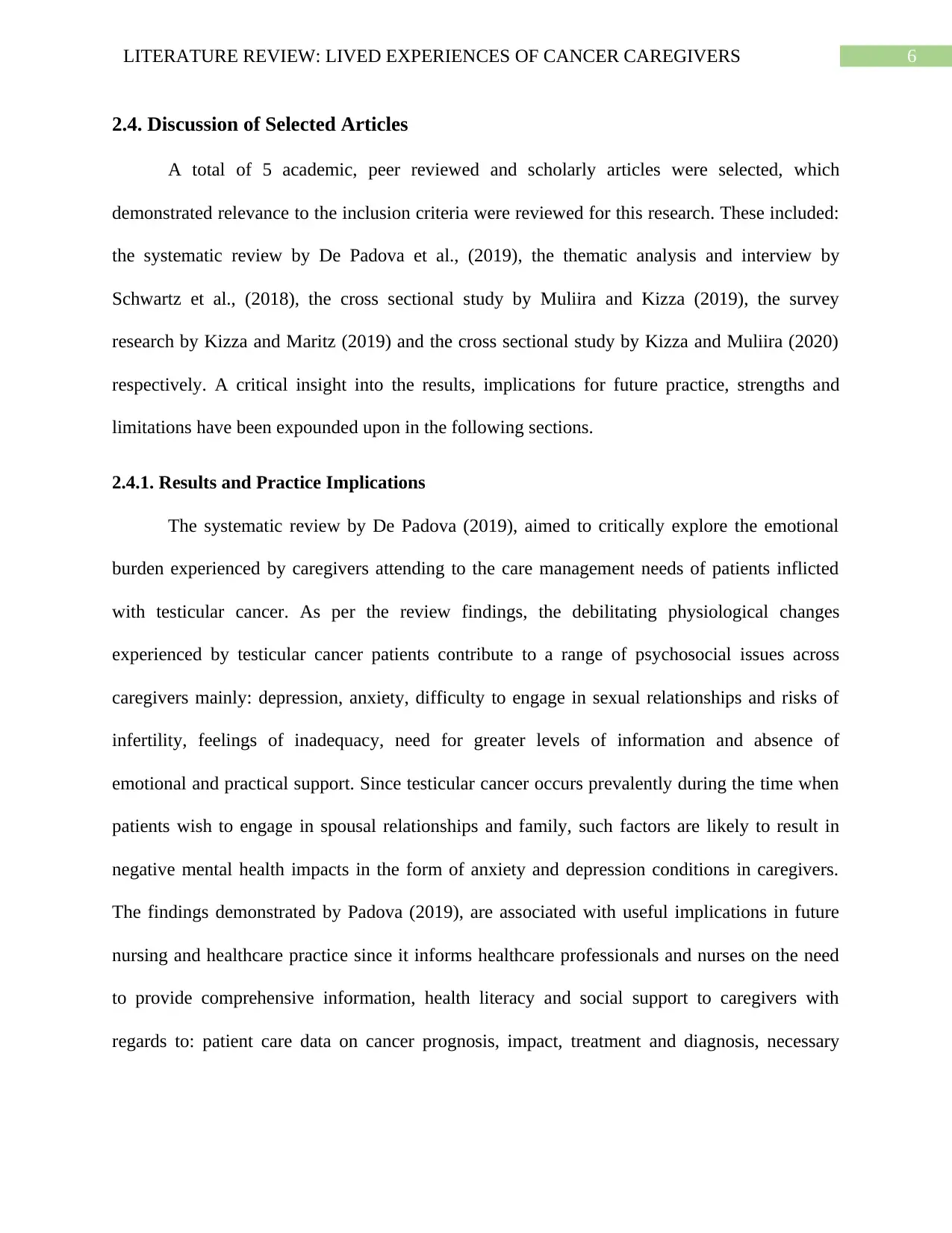
6LITERATURE REVIEW: LIVED EXPERIENCES OF CANCER CAREGIVERS
2.4. Discussion of Selected Articles
A total of 5 academic, peer reviewed and scholarly articles were selected, which
demonstrated relevance to the inclusion criteria were reviewed for this research. These included:
the systematic review by De Padova et al., (2019), the thematic analysis and interview by
Schwartz et al., (2018), the cross sectional study by Muliira and Kizza (2019), the survey
research by Kizza and Maritz (2019) and the cross sectional study by Kizza and Muliira (2020)
respectively. A critical insight into the results, implications for future practice, strengths and
limitations have been expounded upon in the following sections.
2.4.1. Results and Practice Implications
The systematic review by De Padova (2019), aimed to critically explore the emotional
burden experienced by caregivers attending to the care management needs of patients inflicted
with testicular cancer. As per the review findings, the debilitating physiological changes
experienced by testicular cancer patients contribute to a range of psychosocial issues across
caregivers mainly: depression, anxiety, difficulty to engage in sexual relationships and risks of
infertility, feelings of inadequacy, need for greater levels of information and absence of
emotional and practical support. Since testicular cancer occurs prevalently during the time when
patients wish to engage in spousal relationships and family, such factors are likely to result in
negative mental health impacts in the form of anxiety and depression conditions in caregivers.
The findings demonstrated by Padova (2019), are associated with useful implications in future
nursing and healthcare practice since it informs healthcare professionals and nurses on the need
to provide comprehensive information, health literacy and social support to caregivers with
regards to: patient care data on cancer prognosis, impact, treatment and diagnosis, necessary
2.4. Discussion of Selected Articles
A total of 5 academic, peer reviewed and scholarly articles were selected, which
demonstrated relevance to the inclusion criteria were reviewed for this research. These included:
the systematic review by De Padova et al., (2019), the thematic analysis and interview by
Schwartz et al., (2018), the cross sectional study by Muliira and Kizza (2019), the survey
research by Kizza and Maritz (2019) and the cross sectional study by Kizza and Muliira (2020)
respectively. A critical insight into the results, implications for future practice, strengths and
limitations have been expounded upon in the following sections.
2.4.1. Results and Practice Implications
The systematic review by De Padova (2019), aimed to critically explore the emotional
burden experienced by caregivers attending to the care management needs of patients inflicted
with testicular cancer. As per the review findings, the debilitating physiological changes
experienced by testicular cancer patients contribute to a range of psychosocial issues across
caregivers mainly: depression, anxiety, difficulty to engage in sexual relationships and risks of
infertility, feelings of inadequacy, need for greater levels of information and absence of
emotional and practical support. Since testicular cancer occurs prevalently during the time when
patients wish to engage in spousal relationships and family, such factors are likely to result in
negative mental health impacts in the form of anxiety and depression conditions in caregivers.
The findings demonstrated by Padova (2019), are associated with useful implications in future
nursing and healthcare practice since it informs healthcare professionals and nurses on the need
to provide comprehensive information, health literacy and social support to caregivers with
regards to: patient care data on cancer prognosis, impact, treatment and diagnosis, necessary
Paraphrase This Document
Need a fresh take? Get an instant paraphrase of this document with our AI Paraphraser
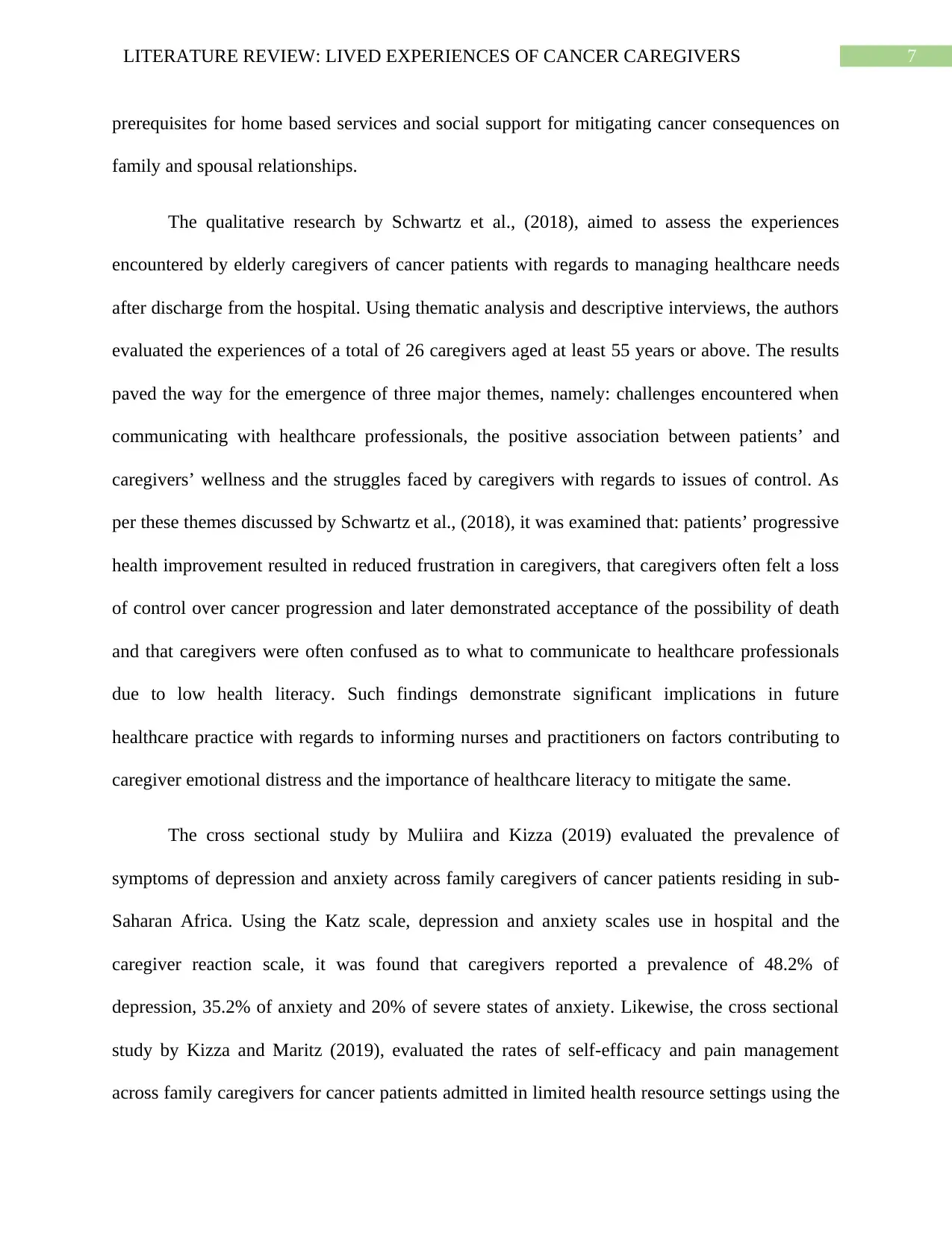
7LITERATURE REVIEW: LIVED EXPERIENCES OF CANCER CAREGIVERS
prerequisites for home based services and social support for mitigating cancer consequences on
family and spousal relationships.
The qualitative research by Schwartz et al., (2018), aimed to assess the experiences
encountered by elderly caregivers of cancer patients with regards to managing healthcare needs
after discharge from the hospital. Using thematic analysis and descriptive interviews, the authors
evaluated the experiences of a total of 26 caregivers aged at least 55 years or above. The results
paved the way for the emergence of three major themes, namely: challenges encountered when
communicating with healthcare professionals, the positive association between patients’ and
caregivers’ wellness and the struggles faced by caregivers with regards to issues of control. As
per these themes discussed by Schwartz et al., (2018), it was examined that: patients’ progressive
health improvement resulted in reduced frustration in caregivers, that caregivers often felt a loss
of control over cancer progression and later demonstrated acceptance of the possibility of death
and that caregivers were often confused as to what to communicate to healthcare professionals
due to low health literacy. Such findings demonstrate significant implications in future
healthcare practice with regards to informing nurses and practitioners on factors contributing to
caregiver emotional distress and the importance of healthcare literacy to mitigate the same.
The cross sectional study by Muliira and Kizza (2019) evaluated the prevalence of
symptoms of depression and anxiety across family caregivers of cancer patients residing in sub-
Saharan Africa. Using the Katz scale, depression and anxiety scales use in hospital and the
caregiver reaction scale, it was found that caregivers reported a prevalence of 48.2% of
depression, 35.2% of anxiety and 20% of severe states of anxiety. Likewise, the cross sectional
study by Kizza and Maritz (2019), evaluated the rates of self-efficacy and pain management
across family caregivers for cancer patients admitted in limited health resource settings using the
prerequisites for home based services and social support for mitigating cancer consequences on
family and spousal relationships.
The qualitative research by Schwartz et al., (2018), aimed to assess the experiences
encountered by elderly caregivers of cancer patients with regards to managing healthcare needs
after discharge from the hospital. Using thematic analysis and descriptive interviews, the authors
evaluated the experiences of a total of 26 caregivers aged at least 55 years or above. The results
paved the way for the emergence of three major themes, namely: challenges encountered when
communicating with healthcare professionals, the positive association between patients’ and
caregivers’ wellness and the struggles faced by caregivers with regards to issues of control. As
per these themes discussed by Schwartz et al., (2018), it was examined that: patients’ progressive
health improvement resulted in reduced frustration in caregivers, that caregivers often felt a loss
of control over cancer progression and later demonstrated acceptance of the possibility of death
and that caregivers were often confused as to what to communicate to healthcare professionals
due to low health literacy. Such findings demonstrate significant implications in future
healthcare practice with regards to informing nurses and practitioners on factors contributing to
caregiver emotional distress and the importance of healthcare literacy to mitigate the same.
The cross sectional study by Muliira and Kizza (2019) evaluated the prevalence of
symptoms of depression and anxiety across family caregivers of cancer patients residing in sub-
Saharan Africa. Using the Katz scale, depression and anxiety scales use in hospital and the
caregiver reaction scale, it was found that caregivers reported a prevalence of 48.2% of
depression, 35.2% of anxiety and 20% of severe states of anxiety. Likewise, the cross sectional
study by Kizza and Maritz (2019), evaluated the rates of self-efficacy and pain management
across family caregivers for cancer patients admitted in limited health resource settings using the
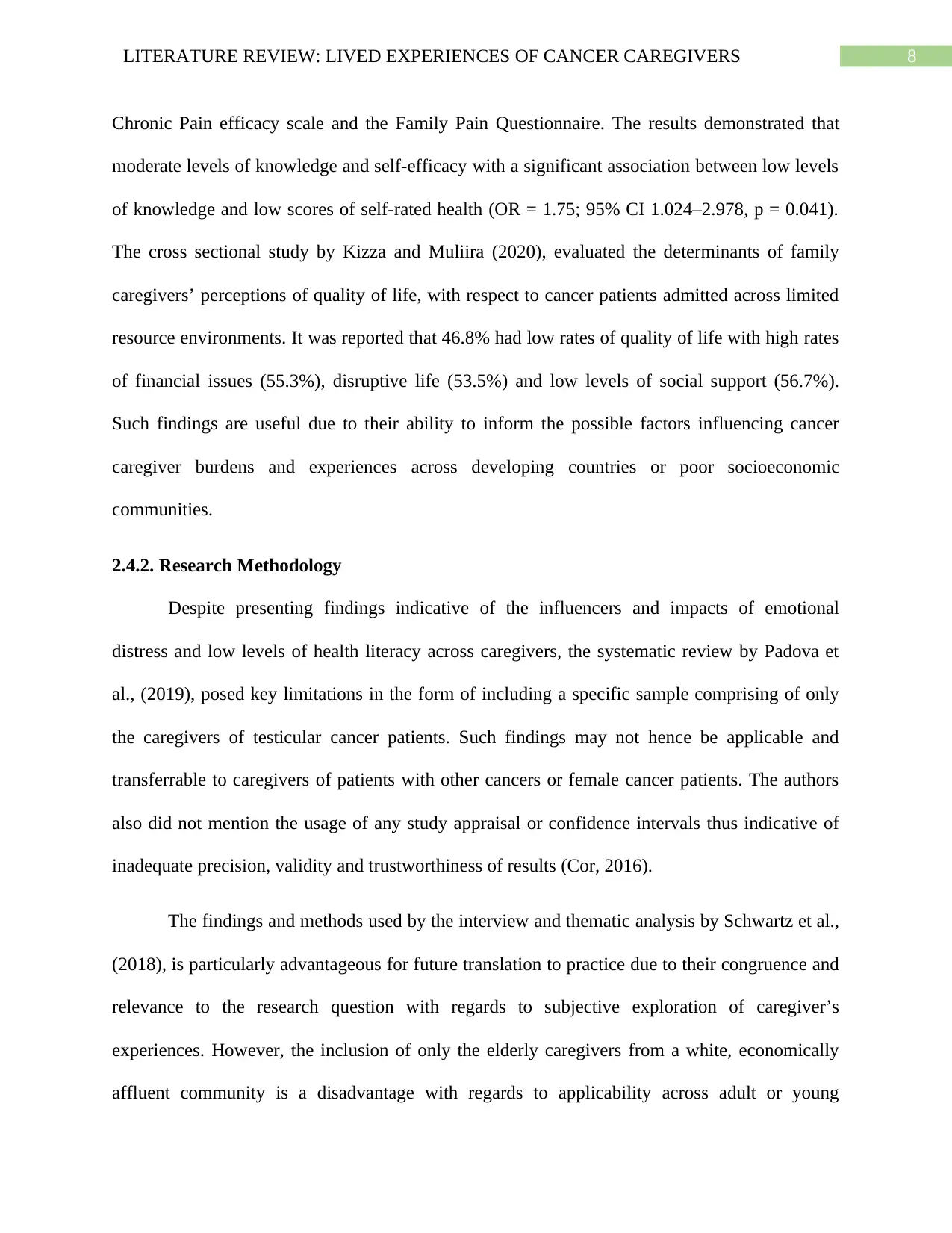
8LITERATURE REVIEW: LIVED EXPERIENCES OF CANCER CAREGIVERS
Chronic Pain efficacy scale and the Family Pain Questionnaire. The results demonstrated that
moderate levels of knowledge and self-efficacy with a significant association between low levels
of knowledge and low scores of self-rated health (OR = 1.75; 95% CI 1.024–2.978, p = 0.041).
The cross sectional study by Kizza and Muliira (2020), evaluated the determinants of family
caregivers’ perceptions of quality of life, with respect to cancer patients admitted across limited
resource environments. It was reported that 46.8% had low rates of quality of life with high rates
of financial issues (55.3%), disruptive life (53.5%) and low levels of social support (56.7%).
Such findings are useful due to their ability to inform the possible factors influencing cancer
caregiver burdens and experiences across developing countries or poor socioeconomic
communities.
2.4.2. Research Methodology
Despite presenting findings indicative of the influencers and impacts of emotional
distress and low levels of health literacy across caregivers, the systematic review by Padova et
al., (2019), posed key limitations in the form of including a specific sample comprising of only
the caregivers of testicular cancer patients. Such findings may not hence be applicable and
transferrable to caregivers of patients with other cancers or female cancer patients. The authors
also did not mention the usage of any study appraisal or confidence intervals thus indicative of
inadequate precision, validity and trustworthiness of results (Cor, 2016).
The findings and methods used by the interview and thematic analysis by Schwartz et al.,
(2018), is particularly advantageous for future translation to practice due to their congruence and
relevance to the research question with regards to subjective exploration of caregiver’s
experiences. However, the inclusion of only the elderly caregivers from a white, economically
affluent community is a disadvantage with regards to applicability across adult or young
Chronic Pain efficacy scale and the Family Pain Questionnaire. The results demonstrated that
moderate levels of knowledge and self-efficacy with a significant association between low levels
of knowledge and low scores of self-rated health (OR = 1.75; 95% CI 1.024–2.978, p = 0.041).
The cross sectional study by Kizza and Muliira (2020), evaluated the determinants of family
caregivers’ perceptions of quality of life, with respect to cancer patients admitted across limited
resource environments. It was reported that 46.8% had low rates of quality of life with high rates
of financial issues (55.3%), disruptive life (53.5%) and low levels of social support (56.7%).
Such findings are useful due to their ability to inform the possible factors influencing cancer
caregiver burdens and experiences across developing countries or poor socioeconomic
communities.
2.4.2. Research Methodology
Despite presenting findings indicative of the influencers and impacts of emotional
distress and low levels of health literacy across caregivers, the systematic review by Padova et
al., (2019), posed key limitations in the form of including a specific sample comprising of only
the caregivers of testicular cancer patients. Such findings may not hence be applicable and
transferrable to caregivers of patients with other cancers or female cancer patients. The authors
also did not mention the usage of any study appraisal or confidence intervals thus indicative of
inadequate precision, validity and trustworthiness of results (Cor, 2016).
The findings and methods used by the interview and thematic analysis by Schwartz et al.,
(2018), is particularly advantageous for future translation to practice due to their congruence and
relevance to the research question with regards to subjective exploration of caregiver’s
experiences. However, the inclusion of only the elderly caregivers from a white, economically
affluent community is a disadvantage with regards to applicability across adult or young
⊘ This is a preview!⊘
Do you want full access?
Subscribe today to unlock all pages.

Trusted by 1+ million students worldwide
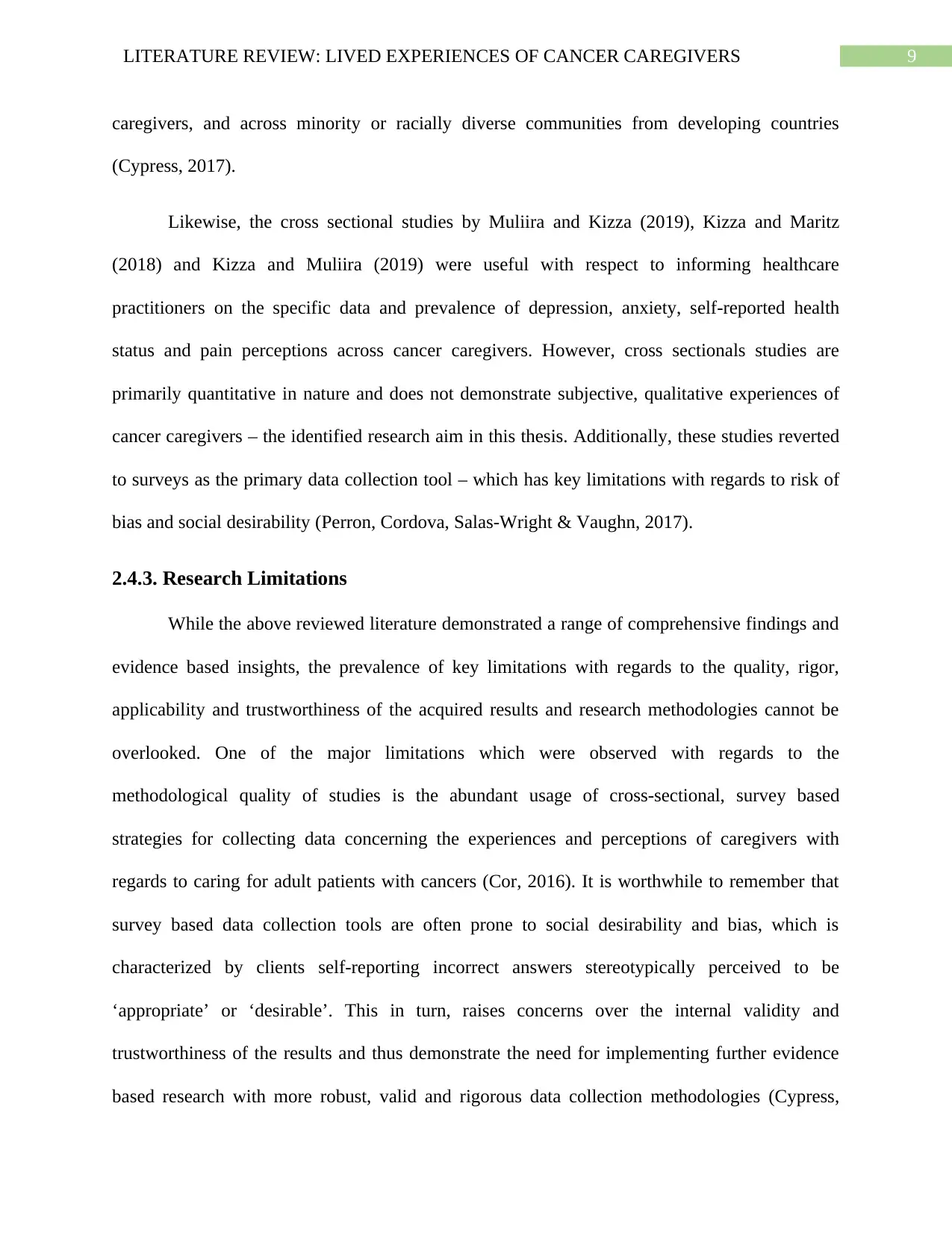
9LITERATURE REVIEW: LIVED EXPERIENCES OF CANCER CAREGIVERS
caregivers, and across minority or racially diverse communities from developing countries
(Cypress, 2017).
Likewise, the cross sectional studies by Muliira and Kizza (2019), Kizza and Maritz
(2018) and Kizza and Muliira (2019) were useful with respect to informing healthcare
practitioners on the specific data and prevalence of depression, anxiety, self-reported health
status and pain perceptions across cancer caregivers. However, cross sectionals studies are
primarily quantitative in nature and does not demonstrate subjective, qualitative experiences of
cancer caregivers – the identified research aim in this thesis. Additionally, these studies reverted
to surveys as the primary data collection tool – which has key limitations with regards to risk of
bias and social desirability (Perron, Cordova, Salas-Wright & Vaughn, 2017).
2.4.3. Research Limitations
While the above reviewed literature demonstrated a range of comprehensive findings and
evidence based insights, the prevalence of key limitations with regards to the quality, rigor,
applicability and trustworthiness of the acquired results and research methodologies cannot be
overlooked. One of the major limitations which were observed with regards to the
methodological quality of studies is the abundant usage of cross-sectional, survey based
strategies for collecting data concerning the experiences and perceptions of caregivers with
regards to caring for adult patients with cancers (Cor, 2016). It is worthwhile to remember that
survey based data collection tools are often prone to social desirability and bias, which is
characterized by clients self-reporting incorrect answers stereotypically perceived to be
‘appropriate’ or ‘desirable’. This in turn, raises concerns over the internal validity and
trustworthiness of the results and thus demonstrate the need for implementing further evidence
based research with more robust, valid and rigorous data collection methodologies (Cypress,
caregivers, and across minority or racially diverse communities from developing countries
(Cypress, 2017).
Likewise, the cross sectional studies by Muliira and Kizza (2019), Kizza and Maritz
(2018) and Kizza and Muliira (2019) were useful with respect to informing healthcare
practitioners on the specific data and prevalence of depression, anxiety, self-reported health
status and pain perceptions across cancer caregivers. However, cross sectionals studies are
primarily quantitative in nature and does not demonstrate subjective, qualitative experiences of
cancer caregivers – the identified research aim in this thesis. Additionally, these studies reverted
to surveys as the primary data collection tool – which has key limitations with regards to risk of
bias and social desirability (Perron, Cordova, Salas-Wright & Vaughn, 2017).
2.4.3. Research Limitations
While the above reviewed literature demonstrated a range of comprehensive findings and
evidence based insights, the prevalence of key limitations with regards to the quality, rigor,
applicability and trustworthiness of the acquired results and research methodologies cannot be
overlooked. One of the major limitations which were observed with regards to the
methodological quality of studies is the abundant usage of cross-sectional, survey based
strategies for collecting data concerning the experiences and perceptions of caregivers with
regards to caring for adult patients with cancers (Cor, 2016). It is worthwhile to remember that
survey based data collection tools are often prone to social desirability and bias, which is
characterized by clients self-reporting incorrect answers stereotypically perceived to be
‘appropriate’ or ‘desirable’. This in turn, raises concerns over the internal validity and
trustworthiness of the results and thus demonstrate the need for implementing further evidence
based research with more robust, valid and rigorous data collection methodologies (Cypress,
Paraphrase This Document
Need a fresh take? Get an instant paraphrase of this document with our AI Paraphraser
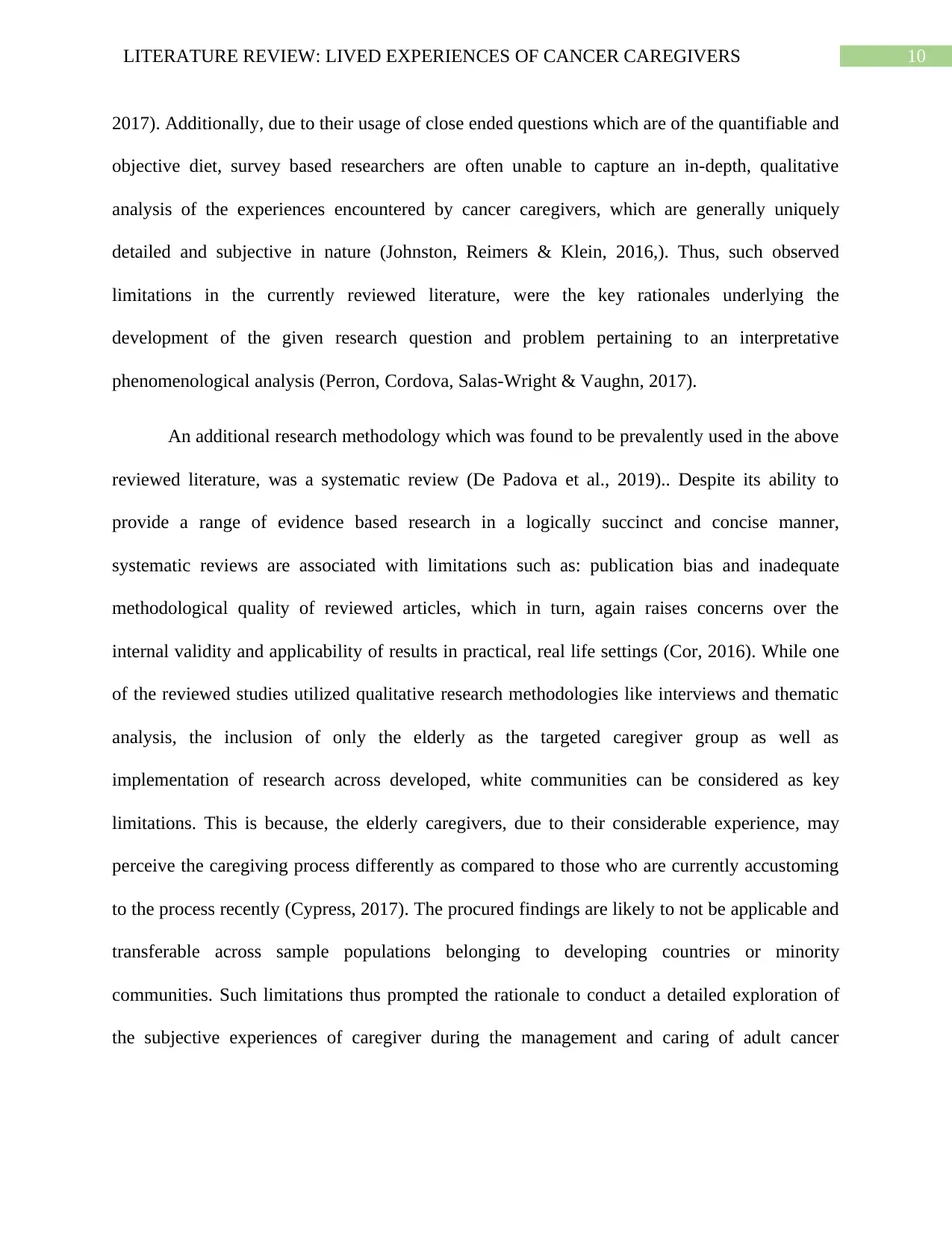
10LITERATURE REVIEW: LIVED EXPERIENCES OF CANCER CAREGIVERS
2017). Additionally, due to their usage of close ended questions which are of the quantifiable and
objective diet, survey based researchers are often unable to capture an in-depth, qualitative
analysis of the experiences encountered by cancer caregivers, which are generally uniquely
detailed and subjective in nature (Johnston, Reimers & Klein, 2016,). Thus, such observed
limitations in the currently reviewed literature, were the key rationales underlying the
development of the given research question and problem pertaining to an interpretative
phenomenological analysis (Perron, Cordova, Salas-Wright & Vaughn, 2017).
An additional research methodology which was found to be prevalently used in the above
reviewed literature, was a systematic review (De Padova et al., 2019).. Despite its ability to
provide a range of evidence based research in a logically succinct and concise manner,
systematic reviews are associated with limitations such as: publication bias and inadequate
methodological quality of reviewed articles, which in turn, again raises concerns over the
internal validity and applicability of results in practical, real life settings (Cor, 2016). While one
of the reviewed studies utilized qualitative research methodologies like interviews and thematic
analysis, the inclusion of only the elderly as the targeted caregiver group as well as
implementation of research across developed, white communities can be considered as key
limitations. This is because, the elderly caregivers, due to their considerable experience, may
perceive the caregiving process differently as compared to those who are currently accustoming
to the process recently (Cypress, 2017). The procured findings are likely to not be applicable and
transferable across sample populations belonging to developing countries or minority
communities. Such limitations thus prompted the rationale to conduct a detailed exploration of
the subjective experiences of caregiver during the management and caring of adult cancer
2017). Additionally, due to their usage of close ended questions which are of the quantifiable and
objective diet, survey based researchers are often unable to capture an in-depth, qualitative
analysis of the experiences encountered by cancer caregivers, which are generally uniquely
detailed and subjective in nature (Johnston, Reimers & Klein, 2016,). Thus, such observed
limitations in the currently reviewed literature, were the key rationales underlying the
development of the given research question and problem pertaining to an interpretative
phenomenological analysis (Perron, Cordova, Salas-Wright & Vaughn, 2017).
An additional research methodology which was found to be prevalently used in the above
reviewed literature, was a systematic review (De Padova et al., 2019).. Despite its ability to
provide a range of evidence based research in a logically succinct and concise manner,
systematic reviews are associated with limitations such as: publication bias and inadequate
methodological quality of reviewed articles, which in turn, again raises concerns over the
internal validity and applicability of results in practical, real life settings (Cor, 2016). While one
of the reviewed studies utilized qualitative research methodologies like interviews and thematic
analysis, the inclusion of only the elderly as the targeted caregiver group as well as
implementation of research across developed, white communities can be considered as key
limitations. This is because, the elderly caregivers, due to their considerable experience, may
perceive the caregiving process differently as compared to those who are currently accustoming
to the process recently (Cypress, 2017). The procured findings are likely to not be applicable and
transferable across sample populations belonging to developing countries or minority
communities. Such limitations thus prompted the rationale to conduct a detailed exploration of
the subjective experiences of caregiver during the management and caring of adult cancer
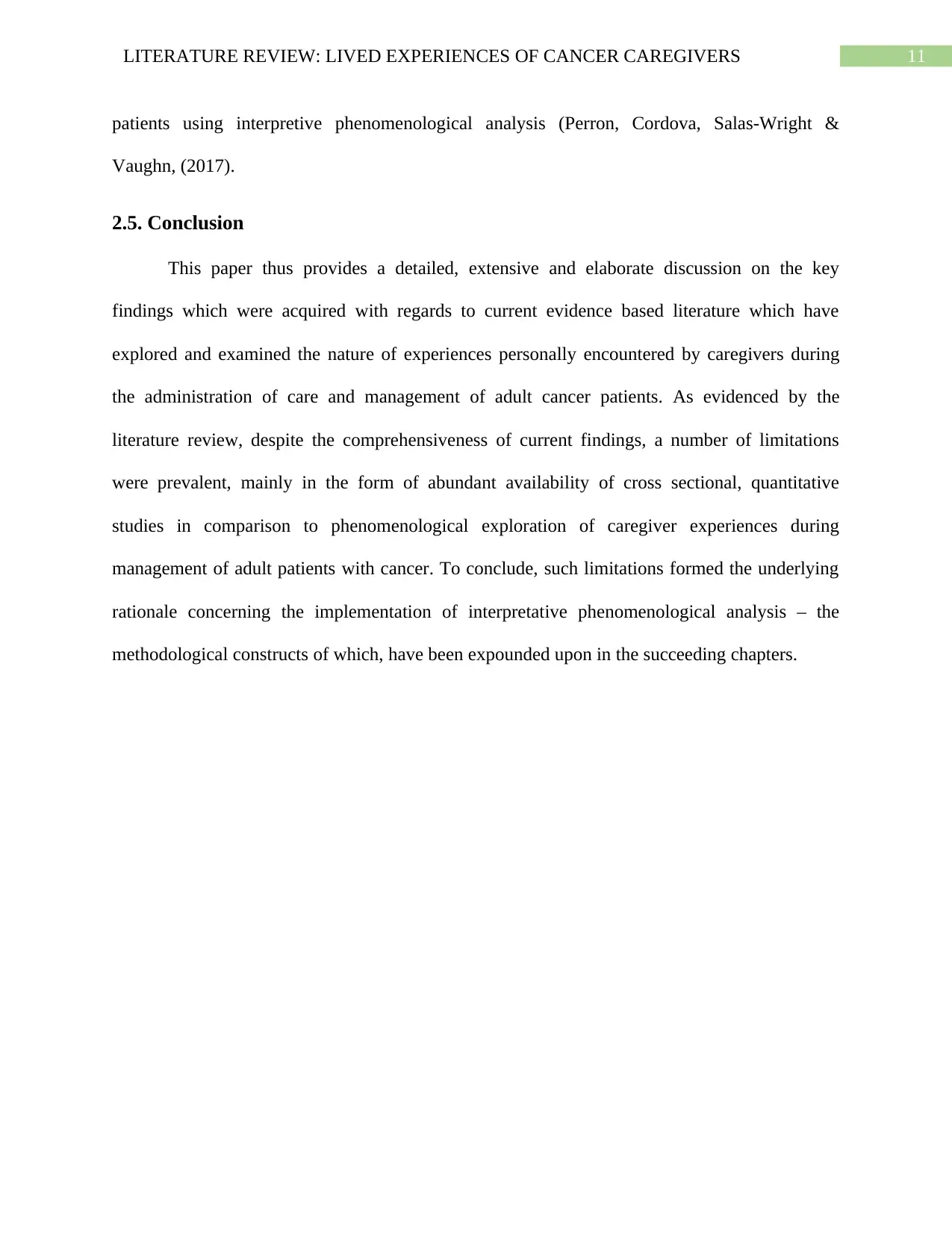
11LITERATURE REVIEW: LIVED EXPERIENCES OF CANCER CAREGIVERS
patients using interpretive phenomenological analysis (Perron, Cordova, Salas-Wright &
Vaughn, (2017).
2.5. Conclusion
This paper thus provides a detailed, extensive and elaborate discussion on the key
findings which were acquired with regards to current evidence based literature which have
explored and examined the nature of experiences personally encountered by caregivers during
the administration of care and management of adult cancer patients. As evidenced by the
literature review, despite the comprehensiveness of current findings, a number of limitations
were prevalent, mainly in the form of abundant availability of cross sectional, quantitative
studies in comparison to phenomenological exploration of caregiver experiences during
management of adult patients with cancer. To conclude, such limitations formed the underlying
rationale concerning the implementation of interpretative phenomenological analysis – the
methodological constructs of which, have been expounded upon in the succeeding chapters.
patients using interpretive phenomenological analysis (Perron, Cordova, Salas-Wright &
Vaughn, (2017).
2.5. Conclusion
This paper thus provides a detailed, extensive and elaborate discussion on the key
findings which were acquired with regards to current evidence based literature which have
explored and examined the nature of experiences personally encountered by caregivers during
the administration of care and management of adult cancer patients. As evidenced by the
literature review, despite the comprehensiveness of current findings, a number of limitations
were prevalent, mainly in the form of abundant availability of cross sectional, quantitative
studies in comparison to phenomenological exploration of caregiver experiences during
management of adult patients with cancer. To conclude, such limitations formed the underlying
rationale concerning the implementation of interpretative phenomenological analysis – the
methodological constructs of which, have been expounded upon in the succeeding chapters.
⊘ This is a preview!⊘
Do you want full access?
Subscribe today to unlock all pages.

Trusted by 1+ million students worldwide
1 out of 16
Related Documents
Your All-in-One AI-Powered Toolkit for Academic Success.
+13062052269
info@desklib.com
Available 24*7 on WhatsApp / Email
![[object Object]](/_next/static/media/star-bottom.7253800d.svg)
Unlock your academic potential
Copyright © 2020–2026 A2Z Services. All Rights Reserved. Developed and managed by ZUCOL.




